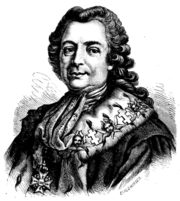
Anders Johan von Höpken
Encyclopedia

Stockholm
Stockholm is the capital and the largest city of Sweden and constitutes the most populated urban area in Scandinavia. Stockholm is the most populous city in Sweden, with a population of 851,155 in the municipality , 1.37 million in the urban area , and around 2.1 million in the metropolitan area...
– 9 May 1789), Swedish
Sweden
Sweden , officially the Kingdom of Sweden , is a Nordic country on the Scandinavian Peninsula in Northern Europe. Sweden borders with Norway and Finland and is connected to Denmark by a bridge-tunnel across the Öresund....
statesman
Statesman
A statesman is usually a politician or other notable public figure who has had a long and respected career in politics or government at the national and international level. As a term of respect, it is usually left to supporters or commentators to use the term...
, was the son of Daniel Niklas von Höpken, one of Arvid Horn
Arvid Horn
Count Arvid Bernhard Horn of Ekebyholm was a Swedish soldier, diplomat and politician. He served twice as President of the Privy Council Chancellery and was one of the leading figures of the Swedish Age of Liberty.- Soldier and diplomat :He was born Arvid Bernhard Horn in Vuorentaka ,...
's most determined opponents and a founder of the Hat party
Hats (party)
The Hats were a Swedish political faction active during the Age of Liberty . Their name derives from the tricorne hat worn by officers and gentlemen. They vied for power with the Caps. The Hats, who ruled Sweden from 1738 to 1765, advocated an alliance with France and an assertive foreign policy,...
.
When in 1738 the Hats came into power the younger Höpken obtained a seat in the secret committee of the diet, and during the Finnish war of 1741-42 was one of the two commissioners appointed to negotiate with Russia
Russia
Russia or , officially known as both Russia and the Russian Federation , is a country in northern Eurasia. It is a federal semi-presidential republic, comprising 83 federal subjects...
. During the diet of 1746-1747 Höpken's influence was of the greatest importance. It was chiefly through his efforts that the estates issued a "national declaration" protesting against the arrogant attitude of the Russian ambassador, who attempted to dominate the crown prince Adolphus Frederick
Adolf Frederick of Sweden
Adolf Frederick or Adolph Frederick was King of Sweden from 1751 until his death. He was the son of Christian August of Holstein-Gottorp, Prince of Eutin and Albertina Frederica of Baden-Durlach....
and the government. This spirited policy restored the waning prestige of the Hat party and firmly established their anti-Muscovite system.
In 1746 Höpken was created a senator. In 1751 he succeeded Carl Gustaf Tessin
Carl Gustaf Tessin
Count Carl Gustaf Tessin was a Swedish politician and son of architect Nicodemus Tessin the Younger and Hedvig Eleonora Stenbock.-Life:Carl Gustaf Tessin was born in Stockholm...
as president of the royal chancellery, and controlled the foreign policy of Sweden for the next nine years. On the outbreak of the Seven Years' War
Seven Years' War
The Seven Years' War was a global military war between 1756 and 1763, involving most of the great powers of the time and affecting Europe, North America, Central America, the West African coast, India, and the Philippines...
, he contracted an armed neutrality treaty with Denmark (1756); but in the following year acceded to the league against Frederick II of Prussia
Frederick II of Prussia
Frederick II was a King in Prussia and a King of Prussia from the Hohenzollern dynasty. In his role as a prince-elector of the Holy Roman Empire, he was also Elector of Brandenburg. He was in personal union the sovereign prince of the Principality of Neuchâtel...
.
During the crisis of 1760-1762, when the Hats were at last compelled to give an account of their stewardship, Höpken was sacrificed to party exigencies and retired from the senate as well as from the premiership. On 22 June 1762, however, he was created a count. After the revolution of 1772 he re-entered the senate at the particular request of Gustavus III, but no longer exercised any political influence. His caustic criticism of many of the royal measures, moreover, gave great offence, and in 1780 he retired into private life.
Höpken was a distinguished author. The noble style of his biographies and orations has earned for him the title of the Swedish Tacitus
Tacitus
Publius Cornelius Tacitus was a senator and a historian of the Roman Empire. The surviving portions of his two major works—the Annals and the Histories—examine the reigns of the Roman Emperors Tiberius, Claudius, Nero and those who reigned in the Year of the Four Emperors...
. He was one of six who founded the Royal Swedish Academy of Sciences
Royal Swedish Academy of Sciences
The Royal Swedish Academy of Sciences or Kungliga Vetenskapsakademien is one of the Royal Academies of Sweden. The Academy is an independent, non-governmental scientific organization which acts to promote the sciences, primarily the natural sciences and mathematics.The Academy was founded on 2...
in 1739, and when Gustavus III in 1786 established the Swedish Academy
Swedish Academy
The Swedish Academy , founded in 1786 by King Gustav III, is one of the Royal Academies of Sweden.-History:The Swedish Academy was founded in 1786 by King Gustav III. Modelled after the Académie française, it has 18 members. The motto of the Academy is "Talent and Taste"...
, he gave Höpken the first place in it.

